Service to SteelJoe and Josie Humpage |
In the old days many men stayed in the same workplace all of their working lives, often enough following their fathers into the same firm and having other relatives working there. The Humpage family provide a good example of this. As Joe Humpage is no longer with us, it is Josie who tells their story.
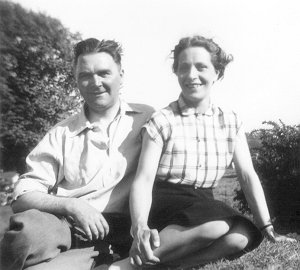
Joe and Josie in 1955 |
Joe Humpage was born in April 1914 and lived in
Woodcross, Coseley. In 1928 he started work as a clerk in the time
office at Bilston Steel Works.
He had long family connections with the works. His uncles worked there. Job was a mills furnaceman, Arthur was a strip mill roller, David was a mills loader, Harold was a rolling mills manipulator and Tom was a plant furnaceman who later went on to become head of the wages department in 1929. Together they totalled about 230 years of service with the steel works. Two years after he started work Joe transferred to the mills records office, where he stayed for three years. In 1934 he actually left the works and worked away for three years but then went back to the steel works time office. In 1948 he was promoted to the wages office |
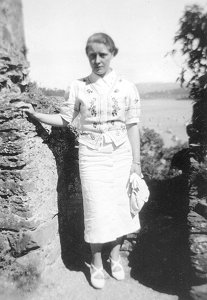
Josie in 1938 |
I started my working life in 1934 at the old Bilston
box factory in Wellington Road. My wages were 7 shillings a week
for a 40 hour week.
Unlike the men, but like most young Black Country girls, I moved around from job to job. It was not difficult in those days with so many vacancies on offer. From the box factory I switched to serving in Turner's cafe on Swan Bank, where I was paid 10 shillings a week plus a free daily dinner. Then I went to work as a shop assistant in Frisby's shoe shop, where I worked from 9.00 am to 5.00 pm Monday, Tuesday, Wednesday, half a day on Thursday, and 9.00 am to 8.00 pm on Friday and Saturday. In addition to our wages we got a small commission on sales. |
Just prior to getting married I took a post as Shop Manageress in a new establishment called Quality Cleaners, which was opening in the High Street. We worked 9.00 am to 6.00 pm on Monday and Tuesday, half a day on Wednesday, and 9.00 am to 8.00 pm on Friday and Saturday. My basic wages came to £1.15.0 a week and an extra 6d for any garment received for a special cleaning process. But by then I had decided on a wedding date.
I had met Joe in 1938, when he was working shifts, from 10.00 pm to 6.00 am one week and from 2.00 pm to 10.00 pm the following week. These long and unsocial hours were normal then. We started serious courting, going for long walks and visiting the cinema at least once a week. And I began to build the traditional bottom drawer, making rugs for our new home.
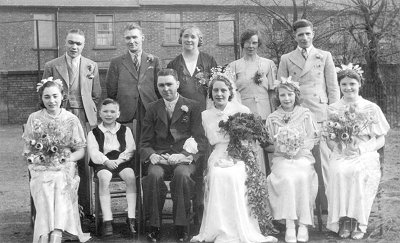 | The wedding group with immediate family. The wedding was held at Holy Trinity, Oxford Street.St. This photo was taken in the grounds behind St. Mary's church, next door. There was a tennis court there and you can see the posts for the netting which stopped balls flying into Tame Street. |
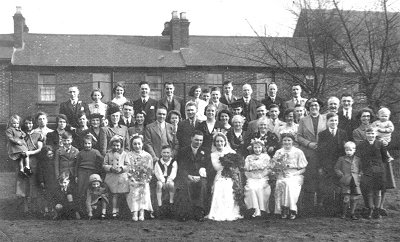 |
This is the full family photo at the wedding. The houses in the background used to stand in Tame Street but have all been replaced now. |
The wedding date was set for Easter Monday, 1940. But because wages were low we had little opportunity to save to cover wedding costs. And with the war situation becoming grimmer we faced problems of rationing and shortages. But with the help of both our families scarificing food rations we managed to overcome the difficulties of putting on a reception. An uncles, aunts, neighbours and friends all pitched in by giving the sort of wedding presents that were traditional at that time - down to earth gifts suitable for starting a home with things like bed linen, towels, cutlery, kitchen utensils and other similar household necessities. We had no honeymoon, mainly because we could not afford one, but anyway Joe was due back at work next day, Easter Tuesday.
At the time housing was a serious headache. There was hardly any housing available for newly married couples. We lived for a short time with in-laws but then we had a sudden stroke of good fortune when a friend told us of a vacant private house available for rent in Hadley Road, Bilston. The asking price was more than we had really wanted but we decided to grab the opportunity and we moved in.
Before long, like many thousands of other Black Country married women, I found myself liable for directed war work. I ended up being sent to work on munitions at Villiers' engineering works in Wolverhampton. I travelled to Wolverhampton on the bus, used the works canteen for meals and worked a daily rota of 7.30 am to 6.00 pm, five days a week. I vividly remember the night bombs were dropped on nearby Ladymoor. That same evening we had to move out of our house at the request of the local air raid warden for safety reasons, as incendiary bombs had fallen on the cemetery grounds and then on the roadway, just missing houses on our street.
I finished working at Villiers in 1942 when I became pregnant and our son, Ron, was born in March 1943. Not long afterwards we rented a piece of land alongside our house to grow vegetables, plant fruit trees and keep chickens.
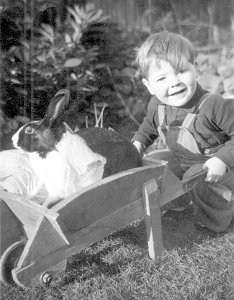
Ron, aged 2, with his rabbit |
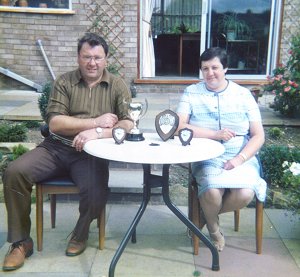
Ron, in later years, with his wife Sylvia, and their gardening trophies |
It was 1950 before we had our first ever holiday, when we went to Paignton.
When Ron left school he to went to work at the steel works, as a furnace bricklayer. Joe was proud of the fact that the family tradition had been carried on. Ron stayed at the works until they closed. He married Sylvia and has a son and daughter, plus three grandchildren. They now live in Penkridge.
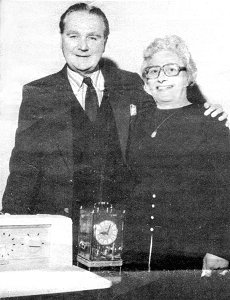 |
Joe finally left the steel works after completing
nearly 46 years service. He was given a teasmade and the
traditional clock. At work he had become known as "the memory man"
because of how well he knew almost everyone at the works. He was
often called on to provide information about people for retirements
and presentations.
This picture of us was published in the local newspaper when Joe retired, with a long account of the many years of work he and his relatives had put in at the steel works. Joe and I eventually moved to Telford having lived in Hadley Road for 25 years. But neither of us ever lost our affection for the part of the Black Country we both grew up in. |
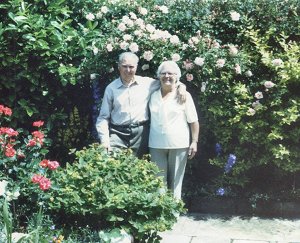 | In retirement, on holiday at Joe's cousins at Burnham-on-Crouch, 1987 |